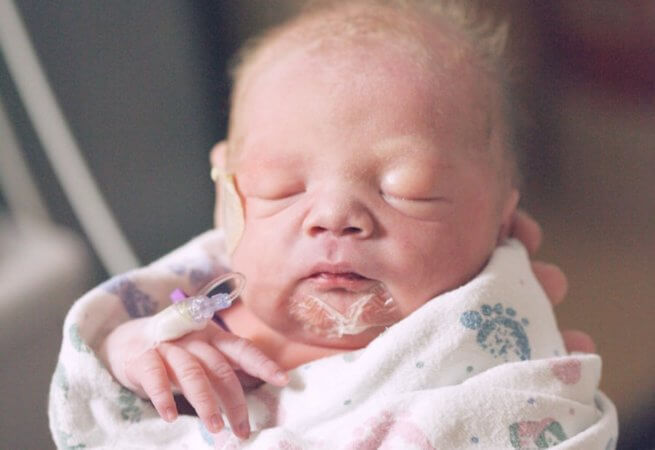My daughter, Faith, was born at twenty-three weeks gestation, weighing only 450 grams. Four grams is less than a pound. She was given no chance of survival. We were initially told she would not even be born alive.
Then we were told she would not survive and we could just hold her and keep her warm as she passed on. My wife, Karen, and I chose instead to try. To pray. To turn to God for help.
Faith was in the NICU for four months as she fought to hold on to life. During that time, I saw quite a few at-risk babies. Most stayed only a day or two. A smaller number remained for a week.
Jamal was the only other baby I knew of who had been there about as long as Faith.
A sign of hope?
Jamal was born very premature and unfortunately had many complications with his heart and lungs. His mother was maybe seventeen. She was a child herself, but she stayed on, visiting almost every day.
The last I saw of Jamal, he was still in the NICU and still on a respirator after many, many months. A sweet mobile of brightly colored plastic birds and clouds hung above his incubator. A sign of hope and love despite it all.
His mother and grandmother were right there by his side. I often saw Jamal’s family in the hospital chapel, where they would be kneeling, praying, and weeping for Jamal’s recovery—sincere, heartfelt, tearful prayers, begging Jesus for healing.
But it never happened.
Questioning the “efficacy of prayer”
I had to ask myself a few uncomfortable questions.
During that same time, Faith had gotten strong, was off the respirator, overcome countless problems, and emerged a normal, healthy infant. It was truly miraculous.
But why was my daughter, who was the smallest and youngest of them all, doing so well, while other babies, like Jamal, suffered through more pain and complications, or even passed away?
Had prayers made a difference for Faith?
I thought so.
But then why not for Jamal?
Why not for other children?
A chaplain at the hospital had counseled us that God always hears the prayer of a parent for a child. I didn’t take much comfort from the idea that God would just hear my prayer and not do anything about it.
To be honest, the idea frightened and disturbed me.
That night I was reading C. S. Lewis’s The Joyful Christian, and I found a chapter called “The Efficacy of Prayer.” In it, Lewis boiled my problem with prayer down to two sentences: “For prayer is request. The essence of request, as distinct from compulsion, is that it may or may not be granted.”
It was a simple statement full of wisdom. Just because a prayer was not answered in the way we asked didn’t mean it wasn’t heard and didn’t mean it wasn’t answered either. It’s a very hard truth that the answer we get might not be the one we long for. It might be yes. It might be no. It might be not yet. That sounds okay philosophically, but hearing no is devastating to take when your child suffers or their life is at stake.
A profound example of how to pray
I didn’t like it, but it rang true to me because even Jesus prayed in this way. Luke describes how, alone in the Garden of Gethsemane––just before he is arrested, beaten, tortured, mocked, and executed—Jesus prays, “Father, if it is your will, take this cup away from me; nevertheless, not my will, but yours be done” (Luke 22:42 NKJV).
Jesus, the Son of God, the most holy, most righteous, most deserving person ever to walk the earth prays to be spared the horrible fate he knows lies ahead. He prays all through the night to the point where he is sweating blood. The result of his impassioned prayers? He is still beaten, tortured, and crucified. Because it was his Father’s will and ultimately for all our greater good.
But what a profound example of how to pray.
To pray fully believing and knowing that God will hear our request, that it is in God’s power to grant the request, but asking that his will, which is perfect for each of us, be done. Like Jesus said, “Not my will, but yours be done.”
Does God have a plan?
I realized that with my limited human intelligence, I would never completely understand why God might allow Faith to live and others like Jamal to suffer or die.
In Isaiah 55:9, God tells us, “As the heavens are higher than the earth, so are my ways higher than your ways, and my thoughts than your thoughts.” His wisdom and will is not of our understanding. He has told us this much. I had to accept that, even if death might be part of his plan.
I’m sure to some this sounds like very convenient rationalization. If all goes well, God decided it was what you needed. If it goes badly, that was what was needed. You interpret events any way you like and God or prayer to God has nothing to do with it. It’s just luck, plain and simple.
I couldn’t accept that. It didn’t resonate. It didn’t have that ring of truth. In my heart I believed God had a plan. Holocaust survivor Vera Goodkin put it this way: “If you’re willing to make a concession and say the limit of human understanding stops at a certain point, then you can salvage your faith.”
I chose to salvage my faith.
God hears you
I felt in my heart that our prayers and those of others made a difference in Faith’s survival. I couldn’t prove it, but I felt it.
I was working toward accepting what the Bible says: that even though there is horrible pain, heinous brutality and abuse, and unfathomable evil on earth—and we won’t ever understand it all while we are here—God remains in control.
Not only that, but that he will hear our prayers, be with us, and help us through it, even if coming through it means death and joining him in eternity.
Or a miracle!
Adapted from A Little Faith: A Father’s Miracle Story of Faith, Hope, Love, and a Micro Preemie by Bob Krech (Belief Books, 2020)



